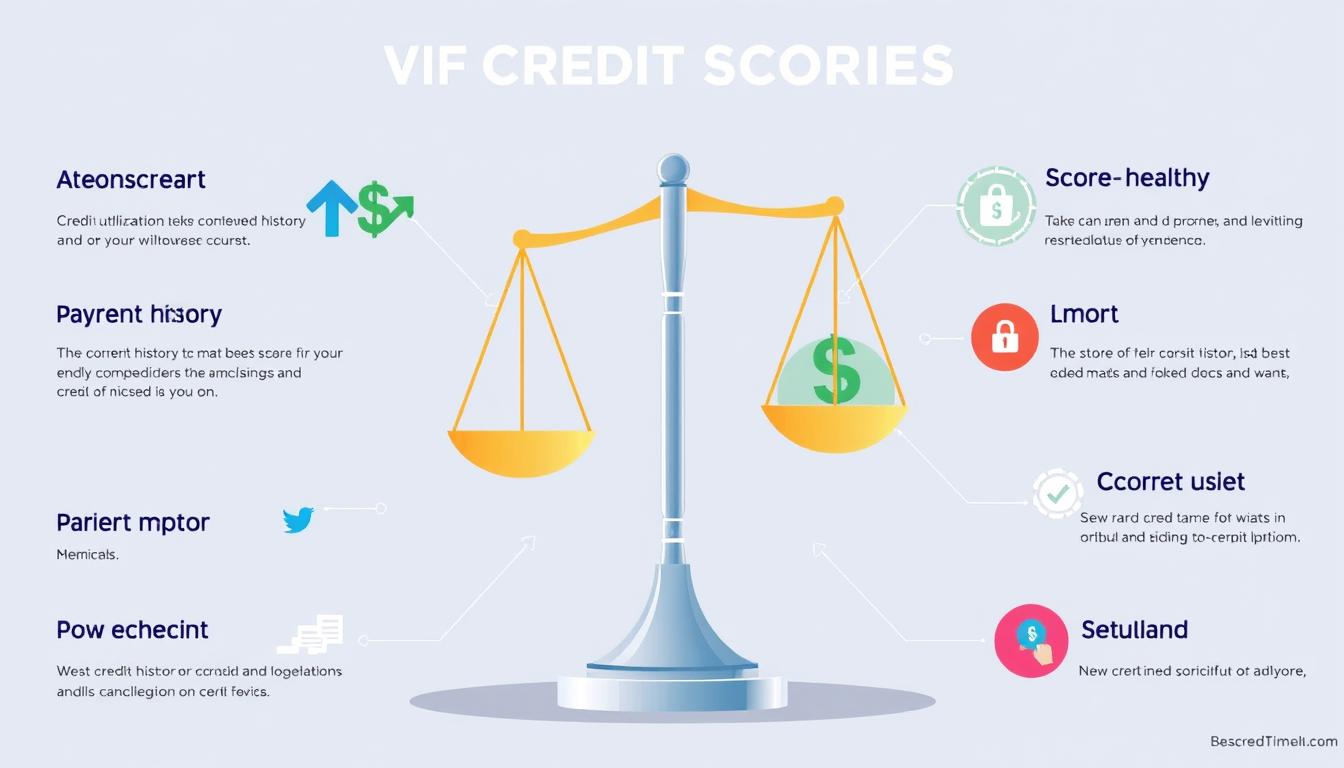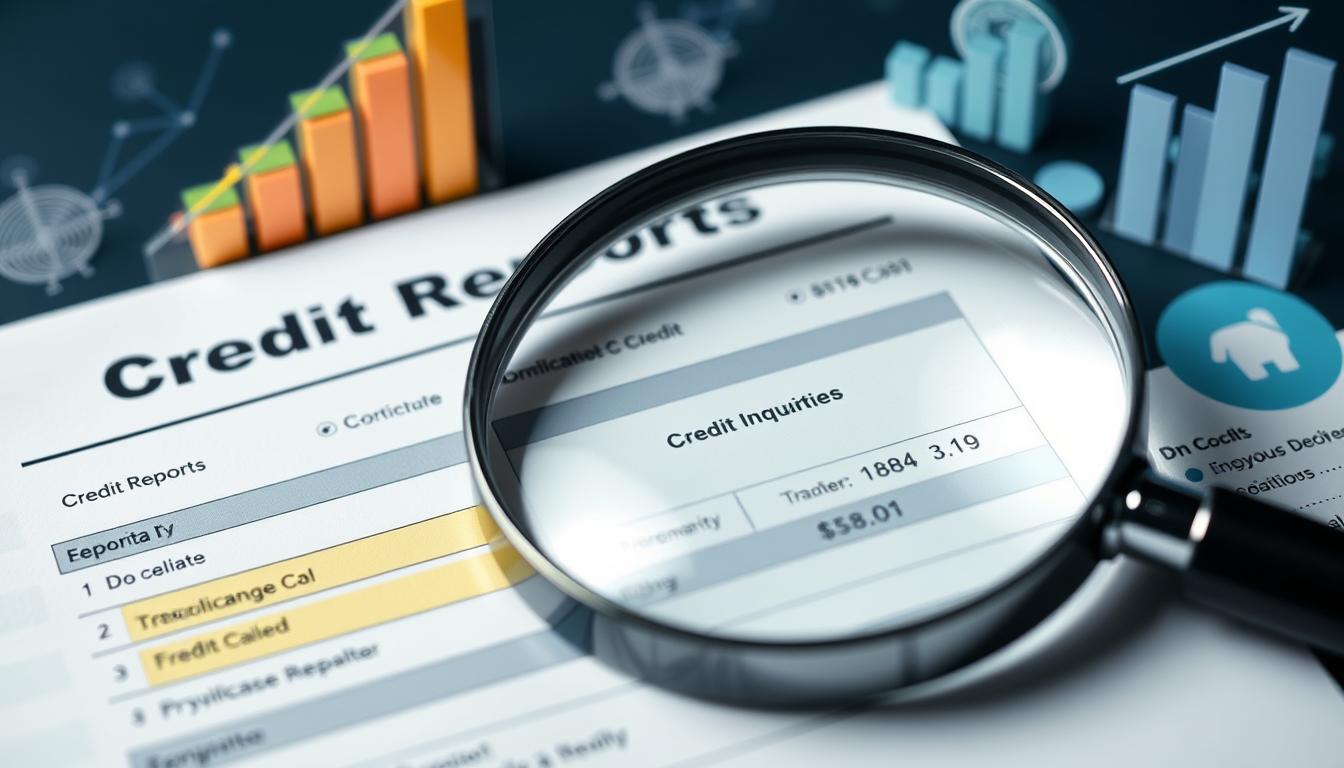Your credit score greatly affects your financial well-being. It impacts your ability to get loans, interest rates, and even rent apartments. Improving your credit score is crucial for achieving financial goals.
This article offers a comprehensive credit score report card. We’ll explain key factors impacting your score and provide strategies to enhance your financial standing.
Key Takeaways
- Understanding your credit score is essential for your financial health.
- Monitoring your credit report regularly can help you identify and address any errors or discrepancies.
- Paying your bills on time and reducing credit card balances are effective ways to improve your credit score.
- Limiting credit inquiries and maintaining a long credit history can also positively impact your credit score.
- Utilizing credit monitoring services can help protect you from identity theft and provide valuable insights into your credit profile.
Understanding Your Credit Score
Your credit score is a vital sign of your financial health. This three-digit number, from 300 to 850, shows how trustworthy you are to lenders. A good score can lead to better rates and more opportunities.
What is a Credit Score?
A credit score reflects your credit risk when you apply for loans. It’s based on your credit history, including payment records and credit use. Lenders use this score to guess how likely you are to repay debts.
The Importance of a Good Credit Score
A strong credit score is key to reaching your financial goals. A high FICO score or credit rating can unlock lower interest rates on loans and cards. It can also lead to better insurance rates and job prospects.
A low credit history can make getting credit, renting, or finding certain jobs harder. Your score shows how responsible you are with money.
“Your credit score is a direct reflection of your financial responsibility. It’s a critical factor that lenders use to evaluate your creditworthiness.”
Knowing the value of your credit score is crucial for your financial future. By making smart money choices, you can keep a healthy credit rating. This will open doors to opportunities you deserve.
Credit Score Report Card
Keeping tabs on your credit score is crucial for financial health. Regular reviews of your credit report ensure accuracy and help improve your score. Stay informed to take control of your financial future.
Monitoring Your Credit Score
Checking your credit score regularly is key to understanding your financial status. You can get free annual credit reports from Equifax, Experian, and TransUnion through AnnualCreditReport.com.
These reports give you a full picture of your credit history. They help you spot any potential issues or discrepancies quickly.
Reviewing Your Credit Report
Examine your credit report closely for any errors or inaccuracies. These mistakes can harm your credit score and limit your access to credit.
They might also affect your ability to secure housing or employment. Address any issues promptly to maintain an accurate financial history.
| Credit Bureau | Contact Information | Website |
|---|---|---|
| Equifax | 1-800-685-1111 | www.equifax.com |
| Experian | 1-888-397-3742 | www.experian.com |
| TransUnion | 1-800-888-4213 | www.transunion.com |
Monitoring your credit score and report provides valuable insights into your financial standing. It allows you to take action to maintain or boost your credit profile.

Factors Affecting Your Credit Score
Your credit score depends on several key factors. Payment history and credit utilization are two important elements. Understanding these can help you maintain a strong credit profile.
Payment History
Payment history is the most crucial factor in your FICO credit score. It makes up about 35% of your total score. This shows how often you pay bills on time.
It includes payments on credit cards, loans, and other financial obligations. Paying on time helps build a positive credit history. It shows lenders you’re a reliable borrower.
Credit Utilization
Credit utilization accounts for about 30% of your credit score. It measures how much of your available credit you’re using. Keeping your credit use below 30% is best for a good score.
This shows lenders you’re using credit wisely. It proves you’re not overspending or relying too much on credit.
| Credit Score Factor | Percentage of FICO Score |
|---|---|
| Payment History | 35% |
| Credit Utilization | 30% |
| Length of Credit History | 15% |
| Credit Mix | 10% |
| New Credit | 10% |
Knowing these credit score factors helps you manage your finances better. Focus on your credit utilization and payment history. This can boost your overall credit score over time.

“A healthy credit profile is key to reaching your financial goals. Focus on the main factors affecting your credit score to secure your financial future.”
Improving Your Credit Score
A strong credit score opens doors to better financial opportunities. Two key strategies can help: timely bill payments and reducing credit card balances.
Pay Bills on Time
Payment history is crucial for your credit score. Pay all bills on time, including credit cards, loans, and utilities. This shows you’re reliable and manage credit responsibly.
A consistent record of on-time payments builds a positive credit profile. It’s the most important factor in determining your score.
Reduce Credit Card Balances
Lowering credit card balances improves your score. Aim to keep your credit utilization ratio below 30%. This ratio compares your used credit to total available credit.
Credit utilization is the second-most important factor in score calculation. Reducing debt can significantly boost your credit score.
These practices build a stronger financial profile over time. Improving your credit score requires patience and effort. The results can transform your financial future.

“Paying your bills on time and reducing your credit card debt are two of the most effective ways to improve your credit score and financial health.”
Credit Inquiries and New Credit
Your credit score affects your financial health. Understanding credit inquiries is key. Applying for credit creates a “hard” inquiry on your report. These inquiries can lower your score slightly.
Rate shopping for mortgages or auto loans within 14 days counts as one inquiry. This reduces the impact on your score. “Soft” inquiries don’t affect your credit score at all.
Be careful with credit applications to avoid too many hard inquiries. This helps maintain a strong credit score. Your financial health will benefit from this approach.
Understanding Hard and Soft Inquiries
- Hard inquiries: These occur when you apply for new credit, such as a credit card or loan. Each hard inquiry can slightly lower your credit score.
- Soft inquiries: These happen when you check your own credit report or receive pre-approved credit offers. Soft inquiries do not affect your credit score.
Monitoring Your Credit Applications
- Be selective when applying for new credit to minimize the number of hard inquiries on your report.
- Take advantage of the 14-day rate shopping window for mortgage or auto loans, as multiple inquiries within this period are typically counted as a single inquiry.
- Regularly review your credit report to ensure that all inquiries are accurate and authorized.
Understand how credit inquiries impact your score. Be mindful of your credit applications. These steps will help maintain a strong credit score.
Regular credit report reviews ensure accuracy. This vigilance protects your financial well-being. Take charge of your credit health today.

“Monitoring your credit inquiries is an essential part of maintaining a healthy credit profile. Stay vigilant and keep your credit applications in check to protect your financial future.”
Length of Credit History
Your credit history length affects 15% of your FICO score. Longer credit histories show better financial management. Lenders view extended credit use positively when assessing creditworthiness.
New to credit? Become an authorized user on a family member’s card. Or, open a secured credit card. These methods help establish credit history and show responsible borrowing.
Avoid closing old accounts. This can shorten your credit history length and lower your credit score. A longer credit history shows responsible financial management to lenders.
“The length of your credit history is a testament to your financial responsibility and discipline. Maintaining open accounts and building a long-standing credit history can be a valuable asset in your financial journey.”
Credit history length and credit age are crucial for financial well-being. Make informed decisions to protect your credit. Practice good habits like timely payments and limiting credit inquiries.
Types of Credit
Your credit score can be influenced by the variety of credit accounts you have. Lenders value a diverse credit mix when assessing your creditworthiness. A healthy mix of credit types can positively impact your credit score.
A diverse credit mix shows you can manage different types of credit responsibly. It can improve your credit profile and make you appear financially stable to lenders.
Understanding the Benefits of a Diverse Credit Mix
A diverse credit mix offers several advantages to your credit score. It demonstrates your ability to handle various credit accounts responsibly.
A mix of revolving credit and installment loans can positively impact your score. It also showcases your financial maturity and management skills.
- It shows lenders that you can handle different types of credit accounts responsibly.
- Having a mix of credit types, such as revolving credit (credit cards) and installment loans, can positively impact your credit score.
- Maintaining a healthy balance between different credit types can demonstrate your financial maturity and management skills.
A diverse credit mix is crucial for improving and maintaining a strong credit score. However, you don’t need every type of credit account.
| Credit Type | Description | Impact on Credit Score |
|---|---|---|
| Credit Cards | Revolving credit accounts that allow you to make purchases and pay back the balance over time. | Having a mix of credit card accounts can positively impact your credit score. |
| Installment Loans | Fixed-term loans, such as auto loans, personal loans, and mortgages, where you make regular payments over a set period. | Responsibly managing installment loans can demonstrate your ability to handle different credit types. |
| Mortgage | A loan used to purchase a home, with the home serving as collateral. | Having a mortgage as part of your credit mix can be beneficial for your credit score. |
“Maintaining a diverse credit mix is an important strategy for building and improving your credit score.”
Credit score report card
Your credit score report card is a snapshot of your financial health. It shows your creditworthiness and key factors affecting your credit score. These factors include payment history, credit use, inquiries, and credit history length.
Regular review of your credit score report helps identify areas for improvement. This insight empowers you to make informed decisions about your finances. It allows you to strengthen your credit score evaluation and overall financial well-being.
Monitoring Your Credit Score
Keeping track of your credit score overview is crucial for financial health. Regular checks help you spot changes and address potential issues quickly. This vigilance protects your financial future.
- Review your credit report periodically to ensure the accuracy of the information.
- Monitor your credit score regularly to understand its fluctuations and identify opportunities for improvement.
- Stay vigilant for any signs of identity theft or fraudulent activity that could negatively impact your credit score report.
Understanding Your Credit Report
Your credit report shows your payment history, debts, and credit use. Reviewing it helps you understand what affects your credit score evaluation. This knowledge is key to improving your financial standing.
| Credit Report Element | Impact on Credit Score |
|---|---|
| Payment History | Accounts for the largest portion of your credit score, highlighting your reliability in making on-time payments. |
| Credit Utilization | Reflects the amount of available credit you are using, which can significantly impact your overall credit score report. |
| Credit Inquiries | New credit applications and inquiries can temporarily lower your credit score evaluation, so it’s crucial to manage them carefully. |
| Credit History Length | The longer your credit history, the more positively it can influence your credit score report. |
Understanding these factors helps you improve your financial health. You can take targeted actions to boost your credit score overview. This approach ensures a strong credit profile over time.
Your credit score report card is a powerful tool that empowers you to take control of your financial future.
Identity Protection and Credit Monitoring
Protecting your identity is crucial in today’s digital world. Identity theft can wreak havoc on your credit score and finances. A good credit monitoring service can alert you to suspicious activity.
These services help you spot potential identity theft quickly. By keeping an eye on your credit report, you can catch unauthorized activity early. This proactive approach helps maintain your financial security.
Protecting Against Identity Theft
Regular credit report reviews are key to detecting unauthorized activity. Quick action can prevent serious damage to your credit score. Stay vigilant to keep your financial information safe.
Credit Monitoring Services
Credit monitoring services offer valuable protection for your identity. They provide tools to safeguard your personal information. These services monitor your credit reports and alert you to any suspicious activity.
With credit monitoring, you can take control of your financial future. It offers peace of mind in an increasingly digital world. Empower yourself by staying informed about your credit status.
FAQ
What is a credit score?
Why is a good credit score important?
How can I monitor my credit score?
What factors affect my credit score?
How can I improve my credit score?
How do credit inquiries affect my credit score?
How does the length of my credit history impact my credit score?
What is credit mix, and how does it affect my credit score?
How can I protect my identity and monitor my credit?
Source Links
- How Your Credit Score Impacts Your Financial Future – https://www.finra.org/investors/personal-finance/how-your-credit-score-impacts-your-financial-future
- CreditScoreReportCard – https://www.creditscorereportcard.com/
- Seven Critical Ways to Improving Your Credit Score – Vista Bank – https://www.vistabank.com/resources/financial-literacy-resource-center/seven-critical-ways-to-improving-your-credit-score/

